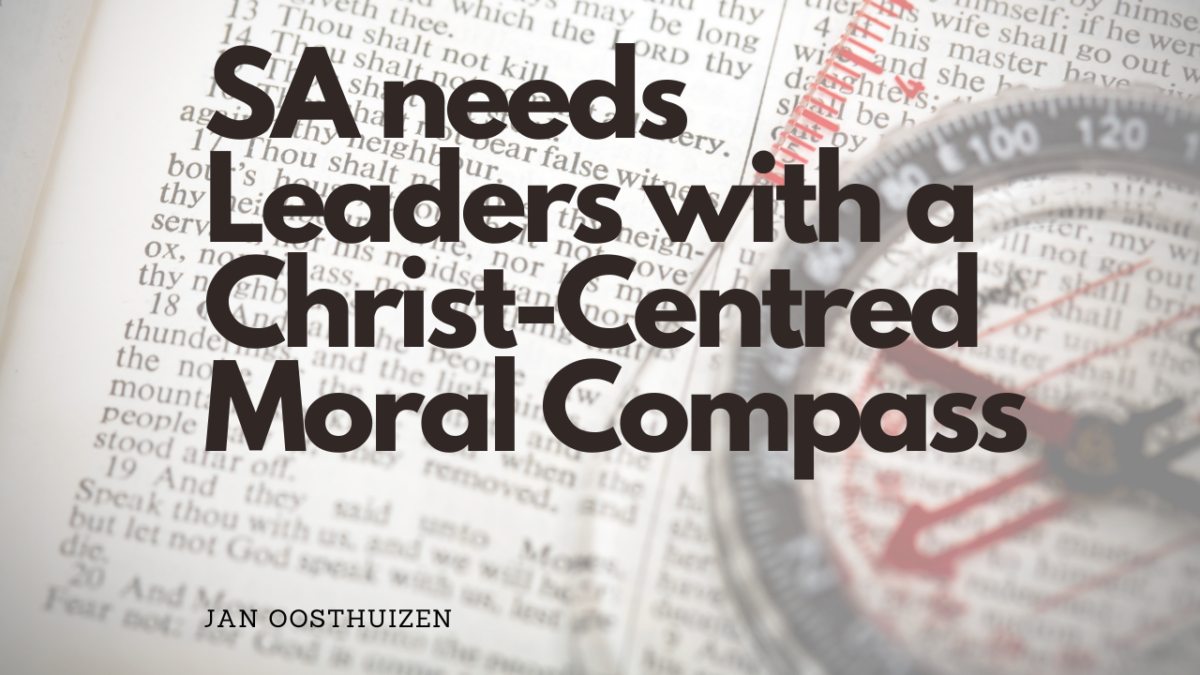The world has never been more in danger of grave self-destruction!
THE DISMAL LACK OF MORAL EXEMPLARY LEADERS!
Recently I was called by the Executive Mayor of the Cederberg Municipality to request all the Spiritual Leaders in our community to take up their God Given Mandate as Custodians of the Moral Standards and Values of Society. Dr Ruben Richards, in his own words: “For the past three decades (since 1994), South Africa has been transitioning from the apartheid past into a democratic dispensation. Unfortunately, that transition remains bedevilled by challenges of significant proportions, which, if not fixed, can see our country plunged into literal and figurative (spiritual) darkness. As a predominantly Christian country, we are emotionally, economically, and spiritually traumatized by ongoing revelations of moral decay at all levels of society. We need our Spiritual Leaders!”[1]
In a world that often seems plagued by greed, laziness, and selfishness, the need for leaders with a strong moral compass is more critical than ever. South Africa, a country rich in diversity and cultural heritage, is no exception. As we navigate the challenges of the modern era, with the emergence of large language models powered by AI, the threat of undetectable fake news and fake information is imminent. The dark storm clouds of the immanent anti-Biblical Woke Culture War regarding critical race theory, gender identity, humanism, and freedom of sexual expression are looming much closer to home than we realize!
We are like sheep without a shepherd! Like a ship in a storm in search of a lighthouse!
In this tumultuous landscape, the need for leaders with a Christ-centred moral compass becomes increasingly imperative.
History is repeating itself!
Since 1994 four successive presidents: Nelson Mandela, Thabo Mbeki, Jacob Zuma, and Cyril Ramaphosa made pleas for a Moral Regeneration Strategy. The SA Government initiated and funded the Moral Regeneration movement, the Ethical Institute, Special Investigating Unit, Hawks (Directorate for Priority Crime Investigation); the National Prosecuting Authority; Zondo Commission (Commission of Inquiry into State Capture). These efforts are praiseworthy and absolutely necessary to safeguard our constitutional democracy, but Kwazi Dlamini succinctly proves in his article how Political interference disbanded the original, highly effective Scorpions, where ALL corruption was investigated[2].
Now 29 years later, the nation is still grappling with issues such as state capture and the devastating revelations of the Zondo Commission, implicating former President Zuma and President Ramaphosa! The latest book by former Eskom CEO Andre De Ruiter[3], exposes similar structural sin and corruption in the same way as Beyers Naude’s prophetic resistance against the Apartheid Government. Already De Ruyter’s book is outselling two previous best sellers: Jacques Pauw’s The President’s Keepers and Kyle Cowan’s Sabotage: Eskom Under Siege. It seems that the silent Majority of the South African Collective is growing increasingly impatient with corruption!
The Church’s Imperfect Example and Silence:
As I am writing this article, there are currently three news articles running in the Volksblad and Burger about the church’ dismal silence against systemic structural sin and corruption. Archbishop Thabo Makgoba of the The Anglican Church gave the following message on the first day of the NG Church in the Western Cape’s synod session: “Do not be silent for fear of being called racist.” The “new struggle” according to him is the struggle to regain the moral compass and our equality of opportunity. (1 June 2023 – Prof Kobus Lazanby, Heidelberg – Volkblad.)
The collapse of the South African social landscape forces every citizen to do its thing, as much as they can. But even greater demands are placed on civil institutions. Gift of the Givers, AfriForum, Solidarity and others bring their side, but where are the churches? What is going on with the churches in South Africa? Where is the protest in the Reformed tradition of the word? Where is the church’s voice? Where is the prophetic voice of the church that is supposed to proclaim God’s name, kingdom and will? (3 June 2023 – Article by Koos Marais, Silver Lakes – Die Burger)
‘The church’s voice is getting quieter and quieter’ Church leaders played a significant role in establishing democracy in South Africa. So why do we still live in a divided country? And, asks Marlene le Roux, where are today’s leaders? A heated debate evolved with more than 70 comments in the Burger (1 June 2023 – Die Burger)
The Church, traditionally seen as an exemplar, has faced its share of moral challenges.[4] Dr. Wim Dreyer from the Department of Church History and Church Polity, Faculty of Theology, University of Pretoria, sites Kinneman regarding the growing perception that the church cannot be trusted, lacks integrity, and has lost its original purpose.
According to Dr. Dreyer recent published literature, including empirical research, reveals a growing disillusionment with ecclesial practices and a disturbing picture of how churches could lose their way and become engrossed in things that bear little semblance to the life and teaching of Christ. Recurring themes are summarised as follows by Dreyer:
Institutionalism:
More traditional churches are perceived to be obsessed with their own survival and the maintenance of the institutional aspects of the church[5].
Materialism:
This trend can be seen in the prominence of mega-churches with elaborate facilities and affluent leaders, as well as the marketing of Christian products and services that cater to material desires. Additionally, there is a growing consumerist mentality within Western Christian culture, where individuals seek to attain and display material possessions as a means of demonstrating their faith and status within the community. [6]
Jesus consistently emphasized the importance of disregarding materialism and outward impressiveness. He taught that true value lies in spiritual and moral qualities rather than in the accumulation of worldly possessions or the pursuit of external appearances. In Matthew 6:19-21, Jesus states, “Do not store up for yourselves treasures on earth, where moths and vermin destroy, and where thieves break in and steal. But store up for yourselves treasures in heaven, where moths and vermin do not destroy, and where thieves do not break in and steal. For where your treasure is, there your heart will be also.” In Mark 8:36, Jesus highlights the insignificance of worldly gains compared to spiritual matters, saying, “What good is it for someone to gain the whole world, yet forfeit their soul?”
Sexual abuse:
Evidence of individuals in positions of religious authority who have been involved in sexual misconduct, revealing a disturbing trend of exploitation and betrayal of trust within religious communities. [7]
Fraudulent ministries:
‘Healing ministries’ proven to be fraudulent is quite common, with news headlines about preachers carried on thrones by their members, inciting their members to spray Doom on themselves to irradicate evil spirits. A quick search on the Internet shows close to a million postings on fraudulent healings. In some cases where patients stopped medical treatment, it led to their death. [8]
People have lost their trust in leaders and institutions:
From the perspective of the wonderful outcomes of the speed of trust, cited by Covey and Merrill we, as a civil society, have come to a complete halt.[9] There seems to be little trust anywhere. The culmination of five hundred years of self-determination at the cost of others through monopolies, racial and class divisions made us the most unequal but also most unstable society ever in history. This is the dark side of capitalism: Self-interest.[10] According to Pareto’s efficiency theory, if we do not balance self-interest with mutuality, we inevitably become an unstable unequal society and collapse on ourselves.[11] The ethical counterbalance of mutuality heals this vested-economic-selfish interest and makes it sustainable in the long term as proposed in Dr. Arno Van Niekers’s new book – The Inclusive Economy: Criteria, Principles And Ubuntu.
An additional result of self-interest and consequent mistrust in civil society and its formal agencies is that we begin to work in silos, sometimes even against each other, with little impact and hopelessly ineffective.[12]There seems to be no common deep-rooted singular purpose national cohesive narrative that connects all these silos. This low-outcome poor service delivery inefficiency throughout most sectors is the most significant contributor to broken trust in a nation.
The Social Fiber of society is disconnected:
The recent reports of international Banks going bankrupt and Mega Church Scandals exasperate the aftermath of Covid 19,s social disconnect, evidenced in the low-attendance-rate of involvement in civil organization meetings like School Boards, Business Chambers, and Police forums and a continual downward lower and lower voter turnout in elections.
The Conscious Leadership and Ethics summit hosted by the Mail & Guardian[13] shed light on the significance of conscience over compliance. Paul Polman, a prominent speaker at the summit, emphasized the importance of doing what is right rather than simply fulfilling the minimum requirements. He referred to society’s crisis due to greed, apathy, and selfishness, highlighting the urgent need for moral and cooperative leadership. This crisis demands leaders who prioritize ethical values and are willing to make principled choices.
Imtiaz Sooliman, the founder of Gift of the Givers, a primary Muslim-financed NGO, emphasized that conscious leadership is a spiritual pursuit. It involves aligning one’s soul with correct behaviour, fostering social cohesion, practicing compassion, and relinquishing ego and greed. True leaders uplift and support others, creating a society built on shared values and empathy.
Embracing Universal Morals:
The universal principles of morality are not exclusive to any specific religious or cultural group. A survey of 60 cultures worldwide revealed that certain moral rules consistently emerged, including helping one’s family and group, returning favours, showing bravery, respecting authority, fair resource distribution, and respecting others’ property.[14] These principles align with the teachings of Christ and provide a framework for ethical leadership.
The root of corruption is illicit means of financial security:
During the Mediation Foundation for Peace and Justice[15] conference at the Cape Castle for the restoration of land and the dignity of the people under the leadership of Alan Nelson, the 18th August 2018 keynote speaker Chief Justice Mogoeng Mogoeng, reminded participants that corruption is not only a government practice, the private sector has also been inundated by corruption scandals.[16] Corporate corruption, including deliberate bankruptcy, thin capitalization, illicit financial flows, transfer (mis)pricing, trade mispricing, jurisdiction shopping, and tax evasion.[17] Curruption Scandals that rocked SA lately is: Steinhoff, EOH, Tongaat Hulett to name a few.
Illicit Financial Flows (IFF) have several sources and channels which generally fall within three major categories: business-related activities (e.g. trade mis-invoicing); criminal activities (e.g. drug trade, human trafficking, illegal arms dealing, smuggling of contraband and tax evasion); and corruption and money laundering.
According to the Report of the High-Level Panel (HLP) on IFFs from Africa commissioned by the African Union (AU) and the United Nations Economic Commission for Africa (UNECA) Conference of Ministers of Finance, Planning and Economic Development (2015),[18] over the last 50 years, Africa has lost in excess of USD 1 trillion in IFFs. A recent report by the AU Commission[19] indicates that “estimates of these amounts hover between USD 50 and 80 billion annually and seem to be on an upward trajectory.[20]
Economics and ethics are inseparable:
Over and above the economic reality of the cost of wages Henry Hazlitt reveals that economics and ethics are, in fact, intimately related. Both are concerned with human action, human conduct, human decision, and human choice. There is hardly an ethical problem, without its economic aspect. Our daily ethical decisions are the main economic decisions, and nearly all our daily economic decisions have, in turn, an ethical aspect.[21]
Thus, there is a need for a Biblical Consensus on the tenets of redemptive entrepreneurship. This is what “ethical trade”[22] and the “International Christian Chamber of Commerce” institutions try to achieve, Christians do business ethically. Moreover, Christians should see their vocation as a redemptive cause! See https://trigaventures.org.
Dale Partridge explains in his book People Over Profit that short-term profit gain, at the cost of the people, eventually leads to long-term decline. History has proven that all lasting commerce is born from a dedication to high moral character, the highest quality, and high customer loyalty.[23]
Roche & Mayer started a collaborative research program between Oxford University and Mars to study the current capitalist system of increasing worldwide inequality, presenting a new model of ‘an economics of mutuality.’ We may soon need a new, more mutually beneficial, and complete form of capitalism that holistically optimizes value for all three inputs—the people, the planet, and financial capital—to reform the current system of financial capitalism that may one day collapse.[24]
Helmut Gollwitzer, a concerned pastor, theologian, and thinker known as a democratic socialist, debated that regardless of our Christian political biases, we need to strive toward a social togetherness – “perfect togetherness without any conflict.”[25] This local community togetherness and economic justice cannot be achieved politically, culturally, economically, or legislatively! This task lays at the Church community’s feet. To disciple the “ethos” where we reside and beyond. (Mat 28:19).
This means in practise: Every Church begins to focus on the own influence sphere and awaken people to the person of Jesus Christ!
What is God’s Heart for His Church – Book by Jan Oosthuizen
The Bible is implicit regarding its warnings about how not to earn a living:
Purposeless Toil (Prov. 23:4); lies (Prov. 21:6); charging interest to family members (Exo 22:25; Deut. 23:19); dishonest gain (Eze 22:13); ponzi & pyramid marketing schemes[26]; fraud, over-promise-under-deliver; slavery & oppression of the poor (Prov. 22:16); unjust scales (Prov. 11:1); quick-profit (Prov. 13:11); default on payments (Ps 37:21; Rom 13:7); passive income (2 Thes. 3:10); extortion & bribes (Luk. 3:14); violence (Prov. 1:19).
In the face of South Africa’s deepening moral crisis, there have been select voices such as Unashamedly Ethical Movement and Crown Financial Ministries who have emerged as beacons of hope. Unashamedly Ethical, a global movement, strives to transform society by taking a stand for ethics, values, and clean living.
The Foundation of our Christian Moral Code:
Jesus established the cornerstone of the Christian moral code. Love for God with all one’s heart, soul, and mind, and loving one’s neighbor as oneself are the foundational principles that promote empathy, compassion, and a sense of responsibility toward others.
Here are some specific examples of how Christ-centred leaders can make a difference in South Africa:
Human Rights vs. Human Wrongs:
- We have chosen human rights at the cost of mutual, reciprocal responsibility.
- We have chosen economic gains and profits at the cost of the people working for those profits.
- We try to correct wrongs by laws and policies but ignore the intricate network of relationships involved.
- We tried to silence the poor with grants and houses, but in the process, they were crying for friendship and inclusion.
- We try to give more people work but regard them as objects and figures on growth charts, dehumanizing them.
- Unions won CCMA cases but lost relationships, vital inherent provisions to the worker’s future.
- Politicians win votes from a minority electorate, but did they build a nation?
- Leaders lobby for votes where they should have built bridges.
Conclusion:
Alfred Tomatis, born into a musical family in France, initially aspired to be a performer like his opera-singer father. However, due to certain assessments, it was determined that he was not suitable for the stage. Consequently, Tomatis pursued a medical career, specializing in Ear, Nose, and Throat (ENT) practices.
During his medical practice, Tomatis’s father referred opera colleagues to him, seeking help for their vocal issues. Through his experience, Tomatis realized that traditional treatments were insufficient, and he also noticed a lack of research on the voice itself. This realization led him to develop a ground-breaking theory that connected vocal problems to hearing problems.
Tomatis’s core theory, “the voice does not produce what the ear does not hear,” became the foundation of his research and his unique methodology.
He found that opera singers had damaged the muscles in their middle ears, resulting in compromised hearing. Consequently, they would exert excessive effort to produce sounds in registers they could no longer perceive.
Could it thus be that one of the primary reasons why the CHURCH and a predominant number of South Africa’s citizenry have lost their moral compass is the result of not hearing and discerning the “small voice of the Holy Spirit” within themselves? Have we become deaf to the voice of God, because of the overwhelming noise of our times? Too many voices, opinions, information, social pressure, anxiety, fear, and personal ego have rendered us deaf to the gentle promptings of the Holy Spirit of God.
May we all be revived and awakened to the person and spirit of Jesus Christ, our spiritual true North!
Thankfully, as listed throughout this article, there is also evidence that some leaders and churches do hear, and are tuned into what the Spirit is saying!!
A follow-up article is thus also needed! The Listing of what the ones are doing who do HEAR and OBEY his call! Amen!
[1] Speech to implore Spiritual Leaders to take up the role of the Moral Custodians of the Community 30 May 2023. Dr Ruben Richards, Executive Mayor of Cederberg Municipality, and Leader of the first Resident Association participating in Local Elections – Cederberg Eerste.
[2] https://www.corruptionwatch.org.za/political-interference-in-south-africas-elite-anti-corruption-unit-leads-to-impunity/
[3] https://www.penguinrandomhouse.co.za/book/truth-power-my-three-years-inside-eskom/9781776390625
[4] Dreyer, W., 2016, ‘Church, mission and ethics: Being church with integrity’,
HTS Teologiese Studies/ Theological Studies 72(1), Art. #3163, 8 pages. htp:// dx.doi.org/10.4102/hts. v72i1.3163 and Kinnaman, D., 2007, unChrisian. What a new generaion really thinks about Chriianity, Baker Books, Grand Rapids, MI.
[5] Viola, F. & Barna, G., 2008, Pagan Chrisianity? Exploring the roots of our church pracises, Tyndale House Publishers, Carol Stream, IL.
[6] Rah, S.-C., 2009, The next evangelicalism. Freeing the church from Western cultural capivity, InterVarsity Press, Downers Grove, IL.
[7] Küng, H., 1968, The Church, Search Press, London.
[8] Randi, J., 1987, The faith healers, Prometheus Books, Bufalo, NY.
[9] Covey, S. and Merrill, R., n.d. The speed of trust.
[10] James, Harvey & Rassekh, Farha. (2000). Smith, Friedman, and Self-Interest in Ethical Society. Business Ethics Quarterly. 10. 659-674. 10.2307/3857897.
[11] As understood by the Pareto Efficiency Principle: Pareto efficiency, named after the Italian economist and political scientist Vilfredo Pareto (1848-1923), is a major pillar of welfare economics.
[12] https://www.forbes.com/sites/brentgleeson/2013/10/02/the-silo-mentality-how-to-break-down-the-barriers/?sh=55d94bf38c7e
[13] https://mg.co.za/thoughtleader/opinion/202
[14] https://www.ox.ac.uk/news/2019-02-11-seven-moral-rules-found-all-around-world
[15] http://peaceandjustice.co.za
[16] https://www.janenchantal.com/report-of-the-restoration-of-land-and-the-dignity-of-the-people-conference-in-the-cape-of-good-hope-castle/
[17] Bracking A qualitative reframing of private sector corruption Considerations from the natural resource sectors in South., 2020. Anti- Corruption Resource Centre U4, [online] August 2013 No 7(U4 Issue), p.2. Available at: <https://www.u4.no/publications/a-qualitative-reframing-of-private-sector-corruption-considerations-from-the-natural-resource-sectors-in-south-africa.pdf> [Accessed 13 August 2020].
[18] https://www.uneca.org/sites/default/files/PublicationFiles/iff_main_ report_26feb_en.pdf
[19] African Union Commission (2019). Domestic Resource Mobilization: Fighting against Corruption and Illicit Financial Flows. AUC Publishing, Addis Ababa.
[20] https://www.oecd.org/tax/transparency/documents/Tax-Transparency-in-Africa-2020.pdf
[21] http://jpatton.bellevue.edu/biblical_economics/morality-economics.html
[22] https://www.ethicaltrade.org
[23] Partridge. Dale, People over Profit, Thomas Nelson, 2015
[24] Roche, B. and Jakub, J., 2017. Completing Capitalism. 1st ed. Oakland, CA 94612-1921: Berrett-Koehler Publishers, Inc.
[25] See Gollwitzer, Protestant Theology : 191 – 2. Gollwitzer draws very briefly here on the imagery found in Mi 4.3f, Zec 3.10, and Rom 14.17.
[26] https://www.crown.org/blog/are-multi-level-marketing-companies-a-r6good-idea-for-christians/









